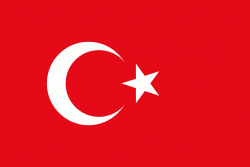Enez (Enez İlçesi)
Enez is a town and a district of Edirne Province, in Thrace, Turkey. The ancient name of the town was Ainos (Αίνος), Latinised as Aenus. The mayor is Özkan Günenç (CHP). The population is 10,886 as of 2018.
Enez consists of an old town centre, backing on to the Meriç/Evros river forming the border with neighbouring Greece; the harbour and Pırlanta Beach, 3 km southwest across the lagoon; and Altınkum Sahili (Golden Sands Beach), another 2 km south, which has been developed as a resort strip mainly catering for domestic tourists.
Despite Enez's proximity to the Greek border there is no crossing point by land here. To cross the border into Greece it is necessary to travel north to İpsala.
The town is located on the left (eastern) bank of the river Meriç (Greek: Evros, historically the Hebrus) where its estuary broadens to flow into the Gulf of Saros (the ancient Melas Gulf) and so into the Aegean Sea. Enez occupies a ridge of rock surrounded by broad marshes. In ancient Greek times it lay on a land route for trade from the Black Sea to the Aegean and was a port for transporting the wood and fruit produced in eastern and central Thrace.
Enez consists of an old town centre, backing on to the Meriç/Evros river forming the border with neighbouring Greece; the harbour and Pırlanta Beach, 3 km southwest across the lagoon; and Altınkum Sahili (Golden Sands Beach), another 2 km south, which has been developed as a resort strip mainly catering for domestic tourists.
Despite Enez's proximity to the Greek border there is no crossing point by land here. To cross the border into Greece it is necessary to travel north to İpsala.
The town is located on the left (eastern) bank of the river Meriç (Greek: Evros, historically the Hebrus) where its estuary broadens to flow into the Gulf of Saros (the ancient Melas Gulf) and so into the Aegean Sea. Enez occupies a ridge of rock surrounded by broad marshes. In ancient Greek times it lay on a land route for trade from the Black Sea to the Aegean and was a port for transporting the wood and fruit produced in eastern and central Thrace.
Map - Enez (Enez İlçesi)
Map
Country - Turkey
 |
|
| Flag of Turkey | |
One of the world's earliest permanently settled regions, present-day Turkey was home to important Neolithic sites like Göbekli Tepe, and was inhabited by ancient civilisations including the Hattians, Hittites, Anatolian peoples, Mycenaean Greeks, Persians and others. Following the conquests of Alexander the Great which started the Hellenistic period, most of the ancient regions in modern Turkey were culturally Hellenised, which continued during the Byzantine era. The Seljuk Turks began migrating in the 11th century, and the Sultanate of Rum ruled Anatolia until the Mongol invasion in 1243, when it disintegrated into small Turkish principalities. Beginning in the late 13th century, the Ottomans united the principalities and conquered the Balkans, and the Turkification of Anatolia increased during the Ottoman period. After Mehmed II conquered Constantinople (Istanbul) in 1453, Ottoman expansion continued under Selim I. During the reign of Suleiman the Magnificent, the Ottoman Empire became a global power. From the late 18th century onwards, the empire's power declined with a gradual loss of territories. Mahmud II started a period of modernisation in the early 19th century. The Young Turk Revolution of 1908 restricted the authority of the Sultan and restored the Ottoman Parliament after a 30-year suspension, ushering the empire into a multi-party period. The 1913 coup d'état put the country under the control of the Three Pashas, who facilitated the Empire's entry into World War I as part of the Central Powers in 1914. During the war, the Ottoman government committed genocides against its Armenian, Greek and Assyrian subjects. After its defeat in the war, the Ottoman Empire was partitioned.
Currency / Language
| ISO | Currency | Symbol | Significant figures |
|---|---|---|---|
| TRY | Turkish lira | ₺ | 2 |
| ISO | Language |
|---|---|
| AV | Avar language |
| AZ | Azerbaijani language |
| KU | Kurdish language |
| TR | Turkish language |















